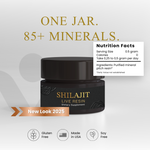Your cart0
Customers also add ...
BEST SELLER

The Hydro Renewal Ritual Shower System
BEST SELLER

The Only 'Dr Daniels Approved' Shilajit
BEST SELLER

Extra Strength Vitality Capsules-The Advanced Cleansing Protocol
0
Total:$0.00 USD
Total: 0 Items
$0.00
0